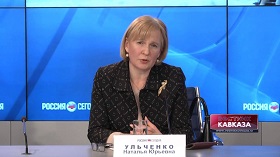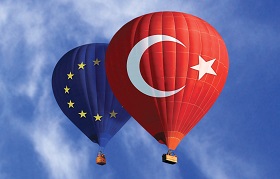Sanctions imposed on Russia by the US and the EU have spurred its search for new directions for cooperation. In this context, Russian leadership sees Turkey as one of the partners with whom it is vital to consolidate economic relations. Moscow and Ankara are now discussing plans for creating a free trade zone. In order to find out how feasible the project is, RIAC editorial board asked N.Ulchenko, head of the Turkish Studies Department at RAS Institute of Oriental Studies, and L.Ratner, independent expert, to speak on the matter.
Sanctions imposed on Russia by the US and the EU have spurred its search for new directions for cooperation. In this context, Russian leadership sees Turkey as one of the partners with whom it is vital to consolidate economic relations. Moscow and Ankara are now discussing plans for creating a free trade zone. In order to find out how feasible the project is, RIAC editorial board asked N.Ulchenko, head of the Turkish Studies Department at RAS Institute of Oriental Studies, and L.Ratner, independent expert, to speak on the matter.
N.Ulchenko, PhD in Economics, leading research fellow at RAS Institute of Oriental Studies, head of the Turkish Studies Department
Turkey is hamstrung in terms of participating in different forms of international trade cooperation (free trade zones and customs unions) by its obligations under previously concluded analogous agreements. First and foremost, we are talking about Turkey’s obligations as a member of the EU Customs Union, an agreement of which was signed 1996. The terms of this agreement allow for duty-free trade among member countries, as well as the application of a common external tariff on goods entering from outside the customs territory. Consequently, Turkey is not free to formulate its own external trade and tariff policies. It should be noted that the European Union has signed free trade agreements with a number of countries, which automatically include Turkey as a member of the EU Customs Union. Russia, however, is not one of these countries.
It is clear that Turkey does not plan to leave the EU Customs Union any time soon, given that the country is sticking to its strategic line of deepening integration with the European Union and achieving full member status, and also the fact that the European Union accounts for more than 40 per cent of Turkey’s imports and exports. Having gone through a difficult adaptation period to ensure compliance with EU technical regulations, Turkey has now reached the stage where its trade relations with the European Union are generally very efficient in terms of improving its balance and reducing its trade deficit. Over the past few years, the import-to-export ratio in Turkey in terms of its trade with the European Union has hovered around 70 per cent (80 per cent at the end of the 2000s), against 50 per cent during the early years of the Union [1].
Therefore, talk of the creation of a free trade zone between Turkey and the Russian Federation is limited to the exemptions Turkey was able to secure in its obligations under its agreement with the European Union. To begin with, the provisions of the customs union to not extend to unprocessed agricultural products. It is worth noting that the definition of this category of products in EU norms is rather extensive: processed agricultural goods refer only to products containing milk, sugar and flour. Consequently, canned vegetables, tomato paste, dried fruits and unsweetened juice are considered agricultural products that can be traded under a free trade regime, including with Russia. Secondly, a free trade agreement between Turkey and the European Coal and Steel Community, which controls the trade of iron and steel products across the European Union, has been in place since August 1996 and acts as a supplement to the Customs Union agreement. Under this agreement, Turkey is under no obligation to impose the common external tariff when importing goods that are not regulated by European Coal and Steel Community from outside the European Union. Accordingly, iron and steel products are also a potential area for free trade between Turkey and the Russian Federation. Finally, the EU Customs Union does not touch upon the trade of services or the movement of capital flows. The Turkish side has thus expressed its readiness to discuss the creation of a free trade zone that covers agricultural products, iron and steel products, services and mutual investments.
Since the establishment of a free trade zone for agricultural and iron and steel products has little benefit for the Russian side (for example, including agricultural products in a free trade agreement would mean that Turkey would be exempt from paying duties on the rather large quantities of fruit and vegetables imported into the Russian Federation in the absence of a corresponding list of commodities imported into Turkey from Russia for similar concessions), emphasis has been placed on the creation of a free trade zone with regard to services and capital (investment) flows between the two countries.
If an agreement on trading services is agreed upon, it would presumably have to be in line with World Trade Organisation rules, with the provision of additional concessions beyond those provided by the rules and obligations of the WTO to be discussed should the need arise. Plans are to extend the agreement on logistics, construction, telecommunications, financial, healthcare and tourism, audio and video production and e-commerce services.
As for an agreement on mutual investments, it should provide additional guarantees over those assured by the bilateral 1997 Agreement on the Promotion and Protection of Investments. Specifically, the two sides are expected to discuss the possibility of providing investors with rights equal to those of the respective investors or establishing a Most Favoured Nation regime with regard to domestic investors.
L. Ratner, independent expert
Since the early 2000s, and at various political levels, Ankara has repeatedly raised the issue of Turkey and Russia signing some kind of free trade agreement. In autumn 2014 and January 2015, the Turkish Ministry of Economy and the Russian Ministry of Economic Development held negotiations on the matter. They also intend to discuss this issue at their next meeting in late April, 2015.
As a rule, such agreements include several aspects: trade of goods, trade of services, and investments. The potential agreement between Russia and Turkey opens up different possibilities for both sides. Its most vulnerable aspect appears to be the agreement on the free trade of goods. Turkey has been a full member of the EU Customs Union since 1996. Members of the Customs Union set a common external tariff with regard to third countries, meaning that Turkey’s hands are tied when it comes to matters of foreign trade tariff policies. Signing such an agreement with Russia (a non-EU country that does not have a free trade agreement with the European Union) would appear to be impossibility under any circumstances.
Despite a number of sensational announcements from high-ranking CIS politicians in recent months [2], Turkey will never be able to join the slender ranks of the Eurasian Customs Union of Russia, Belarus, Kazakhstan and Armenia, barring a global political cataclysm, of course.
It should be noted, however, that when Turkey signed the customs agreement with the European Union it was able to secure a number of exemptions from the common external tariff, specifically with regard to unprocessed agricultural products. Additionally, Turkey is under no obligation to impose the common external tariff on a number of iron and steel products [3] Thus, Russia and Turkey could hypothetically sign a “truncated” version of an agreement on the free trade of goods, which would include a limited number of products that the Turkish side already offers.
For the Russian side, signing an agreement that covers traditional Turkish exports has no benefit whatsoever, bringing unavoidable losses given the fact that there will not be a counter-flow of products from Russia to Turkey. In this respect, the chances of signing a free trade agreement governing a limited range of goods in close to zero.
Far more promising is the possibility of signing an agreement on trade in the services industry and in investment, but within the framework of the World Trade Organisation. Both sides are interested in liberalizing trade in the services industry (we are talking primarily about banking, construction, logistics, tourism and healthcare). Russia, for example, hopes to increase its (currently very modest) share in bilateral transportation cooperation, while Turkey has long been working on plans to construct a major logistics centre in Southern Federal District. What is more, both sides are interested in developing closer relations and simplifying red tape with regard to the implementation of various construction projects in Russia and Turkey, as well as the banking sector (up to ten banks operate in Russia with Turkish participation, while Sberbank acquired the Turkish Denizbank under very favourable conditions). The significance of tourism for the Turkish economy is well known.
An agreement on mutual investments should be an additional guarantees over those assured by the bilateral 1997 Agreement on the Promotion and Protection of Investments. This topic is relevant for investors in both countries, given the interest in mutual investments and existing difficulties for Russian investors in Turkey and vice versa. Such an agreement could give additional impetus for joint investments, as well as providing mechanisms for dispute resolution.
Negotiations at the expert level with regard to balancing the positions of the two sides on the trade of services and on investments can only take place after the Turkish general elections in June 2015 and a new government is formed, i.e. in autumn 2015 at the earliest. Given the often lengthy negotiation period in such cases, an actual formal agreement is unlikely to be agreed upon before 2016, even under the most favourable of conditions.
1. Ekonomik Rapor 2013. Ankara, Türkiye Odalar ve Borsalar Birliği, 2014. S.136.
2. http://ria.ru/economy/20131024/972393944.html (in Russian).
3. � http://ec.europa.eu/taxation_customs/customs/customs_duties/rules_origin/
customs_unions/article_414_en.htm






